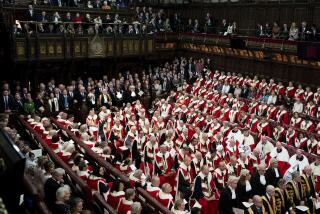In Britain, effort to reform House of Lords founders
- Share via
LONDON — The British government was dealt an embarrassing setback Tuesday in its attempt to turn the unelected tradition-bound House of Lords into a more modern, more democratic chamber better suited to the 21st century.
Although members of the House of Commons agreed to let a reform bill go forward, the government was forced to cancel a vote Tuesday night to expedite the legislation and prevent it from being filibustered. Without that, prospects are uncertain for the controversial proposal to overhaul an institution one political scientist described as “one of the most curious of the curious anomalies in British public life, defying all logic of democratic and secular politics.”
Though no longer the bastion of aristocratic privilege it used to be, the House of Lords remains an unelected body comprising about 825 “peers of the realm,” the vast majority of whom are political appointees awarded lifelong tenure for their public service, professional expertise or close ties to the party in power.
At the behest of its junior coalition partner, the Liberal Democrats, the Conservative-led government of Prime Minister David Cameron has proposed transforming the historic upper body into something akin to a Senate.
The number of members would be capped at 450, and 80% of them would be elected, to serve 15-year terms. Perhaps most alarming to those who enjoy the House of Lords’ elevated status and the ceremonial scarlet robes with ermine trim, members would no longer be called “lords” and “ladies,” though a new title has yet to be chosen.
“We, all of us here, believe in democracy. We believe that the people who make the laws should be chosen by the people subject to those laws,” Deputy Prime Minister Nick Clegg, the leader of the Liberal Democrats, told the House of Commons on Monday at the start of a two-day debate. “That principle … was established in Britain after centuries of struggle.”
But more than 70 Conservative members of Parliament signed a letter this week objecting to the reforms as hasty and ill-advised. Faced with the backbench rebellion, which the opposition Labor Party gleefully promised to support despite its own stated commitment to retooling the House of Lords, the government abandoned its anti-filibuster vote Tuesday when it became clear it would lose.
Late Tuesday night, a companion vote to let the legislation go forward for eventual deliberation was overwhelmingly approved. But without the measure to limit debate and move the bill along, there is a good chance that opponents will filibuster it.
The proposal’s weakened prospects also threaten to open a dangerous rift between the Conservatives and the Liberal Democrats, whose unlikely 2-year-old coalition has become increasingly strained. The Lib Dems insist on Lords reform as part of their bargain with the Tories, and are likely to blame Cameron and his ministers for failing to whip their lawmakers into line.
They also accused Labor of blatant opportunism, saying the party was more interested in dealing the government a humiliating defeat than fulfilling its own longtime goal of overhauling the upper chamber. It was the Labor government of former Prime Minister Tony Blair that, in 1999, removed the automatic right of hereditary peers — dukes, earls and the like — to sit in the House of Lords.
Though the House of Commons retains primacy in passing laws, the Lords can delay or amend legislation.
“Labor politicians for generations have fought to bring democracy to the Lords,” Charles Kennedy, a Liberal Democrat, wrote in Wednesday’s Guardian newspaper. The party’s decision to side with the Conservative rebels is therefore a purely cynical move “to give a bloody nose to the coalition.”
A Labor spokesman denied the charge.
“We have real problems with some of the substance” of the bill, such as the provision for 15-year terms, said lawmaker Sadiq Khan. “In principle, we believe in Lords reform. We want it to take place, and we hope the government doesn’t abandon it but talks to us to try to address some of the concerns we have.”
More to Read
Sign up for Essential California
The most important California stories and recommendations in your inbox every morning.
You may occasionally receive promotional content from the Los Angeles Times.











